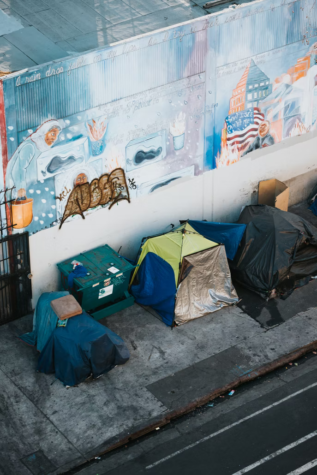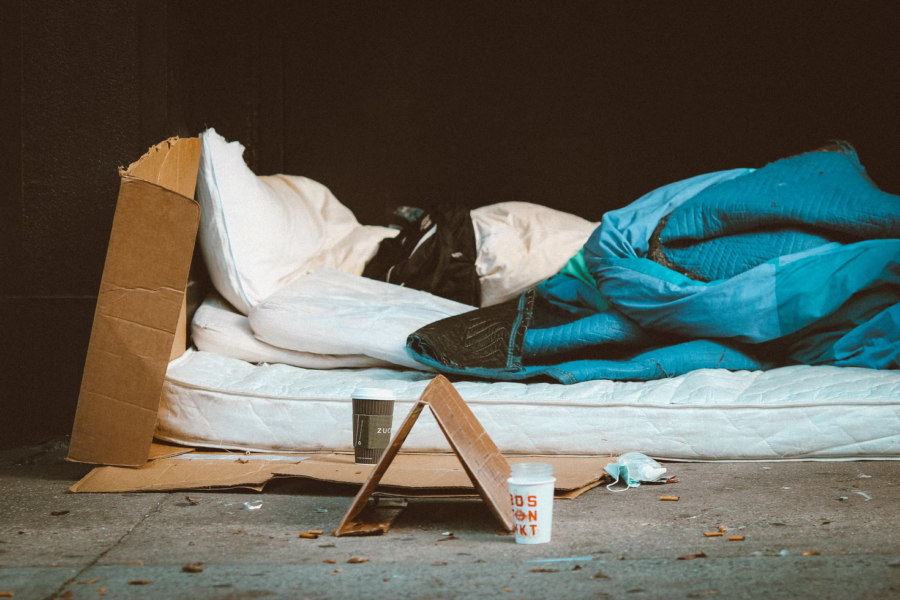The Problems With New York City Homeless Sweeps Under Mayor Adams
One of Eric Adams’s first actions as mayor, amid the pandemic, was to call for the forceful removal of homeless encampments around the city.
While homelessness rates have skyrocketed in the past few years, solutions have not reached everyone.
A garbage truck rumbles by on a busy morning in the city. Of course, this is not an unusual sight, and pedestrians ignore it, continuing their daily business.
They are completely unaware that the mildly annoying vehicle holds someone’s most valuable possessions. The crushed remains of a person’s only shelter lay inside the truck as that person is left, devastated, to fend for themselves in the complicated and sometimes dangerous system of homeless shelters.
Though this may seem like an unrealistic, faraway scenario, it is currently happening throughout New York City. Within his first 100 days in office, Mayor Eric Adams demanded that homeless encampments swiftly be cleared throughout the city. He has made his opinion on homelessness clear: “It’s inhumane. It’s not right.”
While Adams believes that homelessness is “inhumane,” Diana Ayala, chair of the General Welfare Committee, used the same word to describe Adams’s decisions at a City Council hearing.
Adams’s actions have received backlash from regular citizens and officials alike, as many continue to point out the dangerous conditions of the shelters meant to provide refuge to the homeless.
In addition, the forceful removal of these encampments has struck horror with people across the country. Videos and images of people’s belongings being tossed carelessly into garbage trucks have surfaced on social media, causing outrage against the city workers who clear out what may be the last resort option for many.
Countless people have banded together to protest against the homeless sweeps, but various groups of these advocates have been arrested swiftly. For instance, an article by NBC covered the arrest of a group of homeless advocates who had tried to shield those who were living in an encampment from having their possessions cleared. The group stood in the cold and rainy New York City weather for hours before the police forcefully removed them, and the belongings of the homeless.
Regardless of these setbacks, a great number of people, including several members of the Bronx Science community, have continued to challenge and express strong sentiments against Adams’ policy.
Some people believe that the homeless should not be forced out of the places they have settled in, as this policy is taking away their ability to choose where they feel safest.
“Although it may improve sanitary conditions and tourism, which is something New York heavily relies on to sustain its economy, Mayor Adams should not just kick homeless people off the streets. He should ensure that shelters are safer and provide these people with the security they need. By doing so, he will no longer need to kick them out, as they will voluntarily move to shelters if the conditions improve,” said Khado Tsephel ’23.
While numerous citizens oppose Adams’s policy, he stands firm, stating, “I made a commitment that we were going to zero in on encampments so that people who are homeless can live with dignity…There’s nothing dignified about living on the streets.”
Initially, Adams did not clearly provide details for where people living in the encampments would go. He later clarified that his plan includes encouraging those affected by homelessness to seek refuge in the city’s homeless shelters, where countless beds remain empty day after day. He has even stated that city workers clearing encampments will hand out informational brochures that provide a look at what the city’s shelters look like, as well as how to find any additional help the homeless need.
The issue is that these shelters are not always the best option, and many people decide against staying in the conditions that these locations provide.
The shelters take away the freedoms many people take for granted, the most common being autonomy. Those who prefer to find alternatives to these shelters have commonly complained about the strict curfews put in place, which prevent them from coming and going freely from the place that they should be able to call ‘home.’

Privacy is another major concern, as those who stay in a shelter may have to share their living space with strangers and their families. Equally important, safety concerns arise due to these conditions, as the situation can quickly turn dangerous if conflicts arise among those who try to assert boundaries in a communal area.
Some people also have specific mental health and general medical needs, which can prove to be an issue for themselves as well as those living with them. In an interview for CBS, Stuart Smith, who was staying in a hotel instead of a traditional shelter, stated, “I caught COVID in the shelter. Then they had to send me to another hotel. Then the doctors tell them I’m not supposed to be around a lot of people.”
With countless sides to this complicated issue, some people, such as Jayla Mariduena ’25, have mixed opinions on the matter. Mariduena believes that something must be done to keep the homeless off the streets, but Mayor Adams is giving these people no other viable option: “He’s kicking them out without giving them another place they’ll actually want to stay in, so they’re just going to find somewhere else to camp out.”
As many believe, Mayor Adams has done nothing but create a temporary cover-up instead of searching for a more permanent solution at the source of the issue. Therefore, the scale of opposition is understandable, and some people have even proposed alternate solutions.
Arianne Browne ’22 stated, “I think there should be more affordable/accessible housing options for not just homeless people, but everyone in the city. Minimum wage jobs aren’t enough to keep up with the cost of living in this city, and it’s outright cruel to expect people to just go somewhere else when they wouldn’t be on the streets or in subway stations if they had a better option.”
Browne believes that in addition to improving the housing situation, there should be a big focus on the mental and physical health care as well as harm-reduction systems in the city.
“People shouldn’t be struggling on the streets while others are up in skyscrapers making millions a year. It’s a real shocker to see. Everything is a struggle, from a lack of basic necessities and not being able to get the help you need, especially… if you’re on the streets fighting for your life. Most people in New York City are more likely closer to being homeless than to becoming billionaires, so it’s important to have empathy and compassion for those of us who are struggling right now,” said Browne.
Arianne Browne ’22 stated, “I think there should be more affordable/accessible housing options for not just homeless people, but everyone in the city. Minimum wage jobs aren’t enough to keep up with the cost of living in this city, and it’s outright cruel to expect people to just go somewhere else when they wouldn’t be on the streets or in subway stations if they had a better option.”
Elizabeth Colón is a Copy Chief for ‘The Science Survey.’ Elizabeth finds that the most appealing aspect of journalistic writing is how much...

